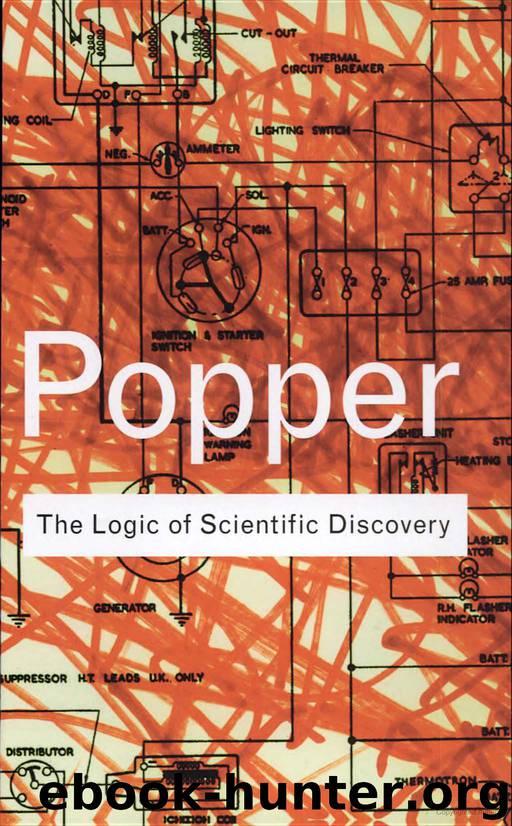The Logic of Scientific Discovery by Popper Karl;

Author:Popper, Karl;
Language: eng
Format: epub
Tags: ebook
Publisher: Taylor and Francis
Published: 2011-09-30T16:00:00+00:00
This probability estimate, as we know, is defined by objective statistical probabilities; that is to say, it is equivalent to the hypothesis that one half of a given class α of light quanta will pass through the mirror whilst the other half will be reflected. Now let a photon k fall upon the mirror; and let it next be experimentally ascertained that this photon has been reflected: then the probabilities seem to change suddenly, as it were, and discontinuously. It is as though before the experiment they had both been equal to 12 , while after the fact of the reflection became known, they had suddenly turned into 0 and to 1, respectively. It is plain that this example is really the same as that given in section 71.*5 And it hardly helps to clarify the situation if this experiment is described, as by Heisenberg,9 in such terms as the following: ‘By the experiment [i.e. the measurement by which we find the reflected photon], a kind of physical action (a reduction of wave packets) is exerted from the place where the reflected half of the wave packet is found upon another place—as distant as we choose—where the other half of the packet just happens to be’; a description to which he adds: ‘this physical action is one which spreads with super-luminal velocity.’ This is unhelpful since our original probabilities,αPk(β) andαPk(), remain equal to 12. All that has happened is the choice of a new reference class—β or , instead of α—a choice strongly suggested to us by-, the result of the experiment, i.e. by the information k ε β or k ε β respectively. Saying of the logical consequences of this choice (or, perhaps, of the logical consequences of this information) that they ‘spread with super-luminal velocity’ is about as helpful as saying that twice two turns with super-luminal velocity into four. A further remark of Heisenberg’s, to the effect that this kind of propagation of a physical action cannot be used to transmit signals, though true, hardly improves matters.
The fate of this imaginary experiment is a reminder of the urgent need to distinguish and to define the statistical and the formally singular probability concepts. It also shows that the problem of interpretation to which quantum theory has given rise can only be approached by way of a logical analysis of the interpretation of probability statements.
Download
This site does not store any files on its server. We only index and link to content provided by other sites. Please contact the content providers to delete copyright contents if any and email us, we'll remove relevant links or contents immediately.
| Anthropology | Archaeology |
| Philosophy | Politics & Government |
| Social Sciences | Sociology |
| Women's Studies |
The remains of the day by Kazuo Ishiguro(8379)
Tools of Titans by Timothy Ferriss(7806)
Giovanni's Room by James Baldwin(6803)
The Black Swan by Nassim Nicholas Taleb(6761)
Inner Engineering: A Yogi's Guide to Joy by Sadhguru(6439)
The Way of Zen by Alan W. Watts(6288)
Asking the Right Questions: A Guide to Critical Thinking by M. Neil Browne & Stuart M. Keeley(5355)
The Power of Now: A Guide to Spiritual Enlightenment by Eckhart Tolle(5329)
The Six Wives Of Henry VIII (WOMEN IN HISTORY) by Fraser Antonia(5234)
Astrophysics for People in a Hurry by Neil DeGrasse Tyson(4998)
12 Rules for Life by Jordan B. Peterson(4160)
Housekeeping by Marilynne Robinson(4059)
The Ethical Slut by Janet W. Hardy(4036)
Skin in the Game by Nassim Nicholas Taleb(3965)
Double Down (Diary of a Wimpy Kid Book 11) by Jeff Kinney(3922)
Ikigai by Héctor García & Francesc Miralles(3889)
The Art of Happiness by The Dalai Lama(3844)
Skin in the Game: Hidden Asymmetries in Daily Life by Nassim Nicholas Taleb(3720)
Walking by Henry David Thoreau(3681)
